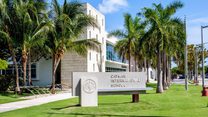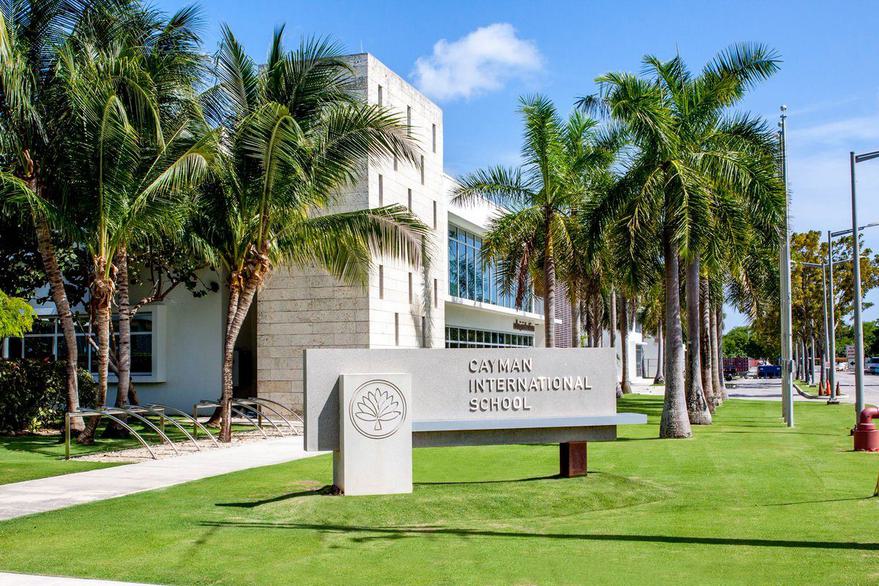On This Page
Enrolment Policy
Due to there being a high demand for a free public education, combined with limited spaces and resources, only Caymanians (including Cayman Status holders) are given priority for the places that are available. After this, spaces are offered to the children of expats who work for the Government and then, if there is space, other expats. Some schools in the outer districts sometimes have spaces available which expats can fill. Caymanians do not have to pay for their schooling, nor do they have to pay for external exams, and they get free meals at school. If an expat child gets into a government school, then their parents are required to pay CI$750 per year for primary school, CI$900 per year for middle school and CI$1,200 per year for high school. For Government schools, everyone must now register online and upload the required documents. These include your child’s birth certificate, residency documents, immunisation record, two forms of proof of your street address plus a previous school report or transcript (Years 1-11) and any Educational Psychological reports, if they apply.
For Government schools everyone must now register online. See Schools.edu.ky/registration and make sure to have all your documents ready to upload. These include your child's birth certificate, residency documents, immunisation record, two forms of proof of your street address plus a previous school report or transcript (Years 1-11) and any Educational Psychological reports, if they apply.
School System
Caymanian students in the Cayman Islands have the option to enter Government primary schools either at the age of four, if there is room in the Reception class, or at age five and in which case the child will skip the Reception year and go straight into Year 1. If the child is four by September 1st then they will enter Reception, and if they are five by September 1st they will enter Year 1. Compulsory education is from age 5 to 17 in the Cayman Islands.
Starting School at 5 in Year 1
Children who skip the Reception class and go straight into Year 1 miss the highly important foundational year when children are taught the phonetic sound of the alphabet, how to blend different letter combinations, how to start writing, and they are taught all the early Maths skills (numbers, colours, shapes, sizes, proportions, early addition, counting etc). Plus they learn to get used to school in a gentle no-pressure class when every other child starts school. Once your child starts in Year 1 they are expected to know all of this, so if for some reason you choose to hold your child back, and do not send them to primary school until they are 5, then make sure that you and their preschool teach them all these foundational skills. They will feel terribly behind if you do not.
In the Cayman Islands compulsory education starts at the age of five, but every private school in Cayman has their students start at age 4. If the Government school in your district has space in their Reception class in September, when your child is four years old, we highly recommend that you take it. Interestingly, there is a rule that non-Caymanian children cannot start in Reception; they have to start in Year 1 or above.
Non-Caymanian children who have been accepted at a government primary school cannot start in Reception; they have to start in Year 1 or above. From Year 1, students follow the Key Stage 1 Cayman Islands National Curriculum, which is adapted from the English National Curriculum, and follow this until the end of Year 2. Key Stage 2 begins in Year 3 at primary school and runs through to Year 6, covering ages 7-11. Some primary schools also follow the International Baccalaureate Programme. Students then move from their government primary school at the end of Key Stage 2 (Year 6) and enter one of three government high schools (or a private school) for Key Stage 3 which covers Years 7-11. In Year 9 students choose three options for GCSE or CXC and then they begin Key Stage 4 in Year 10 and study towards internationally accredited external examinations, following the relevant syllabi depending on what they have chosen. Students complete this two-year programme of classes (Years 10 and 11) in the core subjects of English, maths, science, EDPM (Electronic Document Preparation & Management), PE* and life skills* (*these do not count towards your child's five passes if they are moving on to a private school to do A Levels) as well as the three additional subjects of their choice.
Some Government high schools offer the Goal Accelerated Programme (GAP) where higher-performing students are guided through a far more rigorous academic programme. This includes mentoring and extensive work with the student’s parents to ensure that the children are pushed but supported. This programme ensures that goal-oriented students take additional CXCs or GCSEs as early as Year 9 as well as in Years 10 and 11 when all the other students take their exams.

The Government school system mainly offers the Caribbean Secondary Education Certificate (CSEC) examinations which are commonly referred to as CXC examinations. However, students can take exams set either by a UK exam board (GCSE) or the Caribbean Examinations Council (CXC). Students take, on average, seven CXCs but students may have the option to take more. CXCs are taken by students after five years of secondary school, usually at the age of 16, at the same time or instead of GCSEs. CXCs are graded I-VI with Grades I-III being considered the equivalent of a GCSE pass at A*-C or 9-5 in the newer GCSE exams. For example, a Grade I result means you have attained a comprehensive grasp of the subject, and a Grade VI result means you have attained a very limited grasp of the subject.
If a student reaches the required level at CSEC, or equivalent, they may also be given the option of taking a Caribbean Advanced Proficiency Examination (CAPE) subject, which is the Caribbean equivalent of an A Level. The grading system is similar to CXC exams, with Grade I representing an excellent performance, whereas Grade VII represents an unsatisfactory performance. Grades I–III are the equivalent of an A*-C at A Level. All students are then automatically enrolled in the compulsory Year 12 (one academic year) programme at the Cayman Islands Further Education Centre (CIFEC), where they can take an array of business and technology courses (BTEC), get involved in work experience and internships, or retake CXC or GCSE exams to improve their grade standing. There is also the option for students to enrol in a ‘dual entry programme’ such as A Levels at St. Ignatius, Cayman Prep and High School or a *state boarding school in the UK, or attend the University College of the Cayman Islands and work on an Associate's Degree. After completing their Year 12 programme, students graduate from their original respective secondary schools at the compulsory school leaving age of 17. Those taking A Levels will carry on with their education until the age of 18.
*Note: If neither Cayman Prep nor St. Ignatius offer an A Level that a Caymanian student would love to do, and they have a British passport, then they can apply to a state boarding school in the UK, and the Scholarship Secretariat in the Ministry of Education will consider giving the child a scholarship to attend that school.
Students who do not have the minimum five external passes (at CSEC or GCSE), including English and mathematics (after graduating from high school), may have the opportunity to be admitted to UCCI’s Pre-College Matriculation programme, where they can obtain transferable college credits. This programme allows students to take foundation level courses in maths, English and college skills in order to prepare students to transition into an Associate's Degree programme.
Graduation Rules & Exams
Until June 2014, government high school students graduated with a High School Diploma based solely on attendance and behaviour, and a clutch of external exams (usually CXCs or GCSEs) if they had taken any. However, for a student to officially graduate with a High School Diploma, they now must pass a minimum of five subjects, including Maths and English.They are then graded into one of four academic levels: Level 2 with High Honours, Level 2 with Honours, Level 2 Diploma, Level 1 Diploma – the highest being Level 2 with High Honours. In addition, during their last three years (Years 10-12) they must have at least a 90% or more attendance record, along with less than 14 days of suspension. The levels are based on the number of CXC, GCSE or BTEC exams they pass. For example, the Level 2 Diploma with High Honours means that the student has passed at least nine subjects at A*-B. The nine subjects must include English and Maths. For the last two years, an additional requirement to graduate has been the completion of at least 10 hours of volunteering or community service.
For entry to an A Level programme, a minimum of five passes at CXC or GCSE, including Maths and English, are considered necessary. Further requirements include a minimum grade pass at A*-C or 1-3 which are essential if applying for a government scholarship. For those in the US system, a 2.75 GPA is considered necessary for entry to a university course, but a 3.0 GPA is necessary to qualify for a Cayman Islands Government university scholarship. Those who go on to Level 3 (International Baccalaureate or Advanced Placement diplomas, A Levels or an Associate’s Degree at UCCI) after finishing CXCs/GCSEs at the age of 16, can then pursue a tertiary education if they have achieved passing grades.
Exam Fees
All Caymanians in government high schools no longer have to pay for external exams (CXC/GCSE/BTEC, etc.). Students on a Ministry of Education scholarship doing A Levels are also covered. All other students in public and private schools have exam fees that vary depending on the exam. The average cost to take a GCSE is CI$45 per subject, CI$73 for AS Levels, and for A Level it is CI$98-$103 per subject.
Government Scholarships for A Levels or IB
If a Caymanian student is accepted at either St. Ignatius or Cayman Prep & High School to take A Levels, regardless of whether they went to a public or private high school before that, they can apply to the Scholarship Secretariat for a scholarship to cover their child's school fees. Parents need to be prepared to pay for PTA fees and uniforms, but they no longer have to pay for AS and A Level exam fees and the Government also pays for their lunch while in school. To qualify for financial assistance to cover the fees, students need to have achieved a minimum of five IGCSE/GCSE/CXC passes at grade C or higher and have passed English and maths. To qualify for funding in the second year of the course, students must achieve a minimum of C, C, C in their AS Level exams at the end of the first year of their A Level course. Any money received from the Scholarship Secretariat is paid directly to the school and cannot be used for uniforms or any other incidentals. An additional contribution is also made towards books. Check the scholarship information page on https://moescholarships.gov.ky for further details.
The application period for local scholarship funding is 1st March to 30th April. Late applications will not be considered. For more information on local scholarships see here.
Related Articles
International Baccalaureate System in Government Schools
The IB Primary Years Programme (IBPYP) is offered at three government primary schools in Grand Cayman from Kindergarten to Year 6. These schools are Prospect Primary, Savannah (Joanna Clarke) Primary and Sir John A. Cumber Primary School in West Bay. The IB curriculum which they cover focuses on the development of the whole child as an enquirer, both in the classroom and in the world around us. The curriculum focus for these schools mirrors those presented in schools worldwide; such as languages, social studies, mathematics, arts, science, personal, social and physical education.
The most significant and distinctive feature of the IBPYP is that the curriculum is presented through six transdisciplinary themes. This allows students the opportunity to make connections and identify the relevance to the local and global platforms. These transdisciplinary components help the children explore their beliefs and values; their mental, social, physical and spiritual health; how human relationships work between cultures, communities and families; and the inter-connectedness of individuals and civilisations.
The tenets of the programme are all very relevant to the Cayman Islands, which is a melting pot of over 130 different nationalities. The IB Middle Years Programme from ages 11-16 is not currently offered in Cayman.
(Note: The IB Diploma Programme is offered at Cayman International School for certain students in Grades 11 and 12)
Read More On:
More on Cayman's Schooling System
Cayman School Acronyms 101
CSEC: Caribbean Secondary Education Certificate
GCSE: General Certificate of Secondary Education
BTEC: Business and Technology Education Council
CXC: Caribbean Examination Council
CAPE: Caribbean Advanced Proficiency Test
IB: International Baccalaureate
CIFEC: Cayman Islands Further Education Centre
CIS: Cayman International School
IGCSE: International General Certificate of Secondary Education











